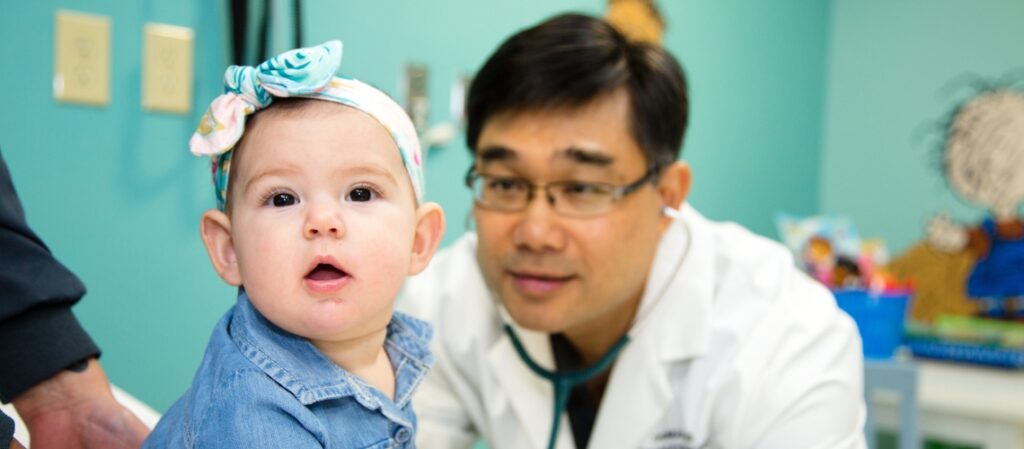As parents, we do everything in our power to keep our children safe, but accidents and illnesses can still happen. When your child is sick or injured, it’s not always easy to know if a trip to the emergency room is necessary. While minor ailments can often be treated at home or by a pediatrician, some situations require immediate medical attention. Knowing the signs of a true pediatric emergency can help you act quickly and get your child the care they need.
At Victoria ER, we are open 24/7 with highly trained emergency physicians ready to provide immediate care for children experiencing medical emergencies. Below are six common pediatric emergencies that require a trip to the ER.
- Difficulty Breathing
Breathing problems can quickly become life-threatening, so if your child is struggling to breathe, seek emergency care immediately. Symptoms to watch for include:
- Rapid breathing or gasping for air
- Wheezing or high-pitched sounds when breathing
- Flaring nostrils or sucking in at the ribs
- Blue or grayish tint around the lips or fingernails
Breathing issues can be caused by conditions such as severe asthma attacks, croup, pneumonia, allergic reactions, or choking. If your child is experiencing difficulty breathing, don’t hesitate—head to the ER right away.
- Severe Fever
A fever is the body’s natural response to infection, but extremely high fevers can be dangerous in young children. Seek emergency care if your child has:
- A fever over 100.4°F (38°C) in an infant younger than three months
- A fever over 104°F (40°C) in older children
- A fever accompanied by difficulty waking, a stiff neck, seizures, or difficulty breathing
- A fever that persists for more than five days
Fevers can indicate serious infections such as meningitis or pneumonia. If your child has an extremely high fever or other concerning symptoms, they need immediate medical evaluation.
- Severe Dehydration
Dehydration can become dangerous quickly, especially in infants and young children who lose fluids from vomiting, diarrhea, or not drinking enough fluids. Signs of severe dehydration include:
- Dry mouth and no tears when crying
- Sunken eyes or sunken soft spot on an infant’s head
- Lethargy, extreme drowsiness, or unresponsiveness
- No urination for over eight hours
If your child is showing signs of severe dehydration, bring them to the ER immediately for IV fluids and medical intervention.
- Head Injuries and Concussions
Children are active and prone to bumps and falls, but some head injuries require emergency care. Bring your child to the ER if they experience:
- Loss of consciousness, even for a few seconds
- Vomiting after a head injury
- Severe headache that worsens over time
- Seizures, confusion, or difficulty speaking
Head injuries can range from mild concussions to more serious brain trauma. Immediate medical evaluation is essential to rule out any internal bleeding or swelling.
- Severe Allergic Reactions (Anaphylaxis)
Allergic reactions can escalate quickly, becoming life-threatening within minutes. Seek emergency care if your child experiences:
- Swelling of the face, lips, or tongue
- Difficulty breathing or swallowing
- Hives covering the body
- Sudden dizziness or fainting
Anaphylaxis is a medical emergency that requires immediate treatment with epinephrine and close monitoring. If your child has a known severe allergy, always carry an epinephrine auto-injector and head to the ER if they show any signs of anaphylaxis.
- Broken Bones and Severe Lacerations
Children love to run, jump, and explore, which sometimes leads to injuries. While minor bumps and bruises can be treated at home, fractures and deep cuts require medical attention. Signs your child needs emergency care include:
- A bone that appears misshapen or out of place
- Severe swelling or bruising around an injury
- Deep cuts that won’t stop bleeding or require stitches
- Inability to move or bear weight on a limb
Broken bones, especially in growing children, need proper medical treatment to heal correctly. Deep lacerations may require stitches to prevent infection and promote proper healing.
Trust Victoria ER for Your Child’s Emergency Care
At Victoria ER, we understand how frightening it can be when your child is sick or injured. That’s why our experienced emergency physicians are available 24/7 to provide expert pediatric care with minimal wait times. We offer advanced diagnostic tools, on-site lab testing, imaging services, and private rooms to ensure your child receives the best care in a comfortable environment.
If you’re ever unsure whether your child’s condition requires emergency care, don’t wait. Bring them to Victoria ER for prompt evaluation and treatment. Your child’s health and safety are our top priorities.


